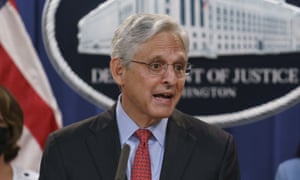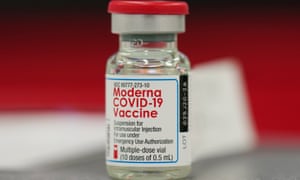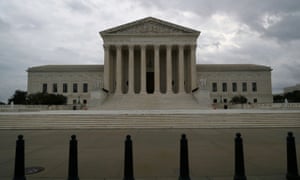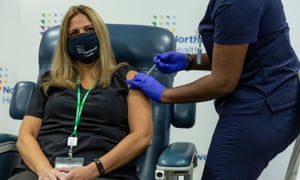
12.07pm EDT12:07

People read the morning newspapers reporting a statement issued by President Uhuru Kenyatta following reports that he is among more than 330 current and former politicians identified as beneficiaries of secret financial accounts, in the low-income Kibera neighborhood of Nairobi, Kenya. Photograph: Brian Inganga/AP
President Biden is expected to provide a Covid-19 response update soon. Later this afternoon, he will also meet with Kenyan leader President Uhuru Kenyatta, in part to discuss, “the need to bring transparency and accountability to domestic and international financial systems.”
Biden came into office calling for a global minimum tax to make sure corporations pay their fair share of taxes. However, since then, the Pandora Papers revealed how the global, shadow financial system has allowed billionaires to avoid tax, including and especially in South Dakota.
Biden is meeting with Kenyatta, who entered office as an opponent of corruption. The Pandora Papers leak revealed that Kenyatta has amassed $30m in offshore wealth, including in London.
Here’s more from the AP:
Kenyatta is one of more than 330 current and former politicians identified as beneficiaries of secret accounts revealed in recent reports known as the Pandora Papers. He and his relatives have some $30 million in offshore holdings, according to reporting by The International Consortium of Investigative Journalists. The consortium obtained millions of leaked documents that detail the hidden wealth of prominent world leaders, politicians, corporate executives and celebrities. Kenyatta has denied wrongdoing.
Biden was expected to address the “elephant in the room” during his afternoon meeting in the Oval Office with Kenyatta and senior Kenyan officials, according to a senior administration official who was not authorized to publicly discuss the matter and spoke on the condition of anonymity.
White House press secretary Jen Psaki said Biden has been vocal about what he sees as “inequalities” in the international financial system.
“That doesn’t mean we don’t meet with people you have disagreements on,” Psaki said. “We have a range of interests in working with Kenya and working with them on issues in Africa, in the region, and that will be the primary focus.”
11.50am EDT11:50
Attorney general to testify before House committee

Attorney General Merrick Garland announces a lawsuit to block the enforcement of a new Texas law that bans most abortions in September. Photograph: J Scott Applewhite/AP
The attorney general, Merrick Garland, will make his first appearance before the House Judiciary Committee next week. The testimony is likely to touch on everything from a severe near-total abortion ban in Texas to voting rights and gun violence.
Garland is scheduled to testify 21 October. His appearance was first reported by Politico.
Updated
at 12.02pm EDT
11.38am EDT11:38
The FDA panel considering whether to recommend a third half-dose of the Moderna vaccine, called a “booster” to hopefully boost immunity, is hearing from Israeli scientists. They presented evidence showing boosters may help curb severe disease in people older than 60. Israeli data has provided among the strongest arguments in favor of boosters.
However, reporters at STAT note one of the lingering questions that will not be answered by today’s hearing – will immunity wane again after a booster dose? Or will a single booster grant long-term protection?
This is “the $1m question that I don’t have the answer to,” said Sharon Alroy-Preis, Israel’s director of public health services, to the FDA advisors.

An independent panel of experts is considering whether to recommend a booster dose, or third shot, of the Moderna Covid-19 vaccine. Photograph: David Zalubowski/AP
Updated
at 12.04pm EDT
11.23am EDT11:23
Jake Sherman
(@JakeSherman)NEW — in a letter to senate democrats, @SenSchumer announces he’ll file cloture on a bill to overhaul voting laws.
Translation: time is up for @Sen_JoeManchin. He has said he would try to get 10 Republicans on board to break a filibuster. He’s not close. pic.twitter.com/VuHL6ZXNap
In a new letter to Democrats, Senator Chuck Schumer said they must try again to advance a sweeping voting protections in the Freedom to Vote Act. The law is a reaction to Republican states, which had advanced voting restrictions on the back of falsehoods about voter fraud in the 2020 election.
Here’s more from the AP:
If the Republican senators have ideas “on how to improve the legislation, we are prepared to hear them, debate them, and if they are in line with the goals of the legislation, include them in the bill,” Schumer said.
He challenged Republicans not to oppose the measure, blocking it with a filibuster, and “at the very least, vote to open debate.”
A test vote is expected next Wednesday.
Prospects appear dim for the Freedom to Vote Act, a revised effort by Democrats to advance one of their signature legislative efforts this year — protecting and enhancing the nation’s patchwork of state-run election systems. The push for an overhaul comes as Texas and other states are putting in place new voting laws that critics argue are a return to Jim Crow-style restrictions making it difficult to cast ballots, especially in Black and minority communities.
A key Democrat, Sen. Joe Manchin of West Virginia, has led the effort to revise an earlier version of the bill that ran into stiff GOP opposition. He, too, had concerns with its scope. But it is doubtful Manchin’s effort on the now-scaled back bill will win over many Republican supporters.
In the evenly-split 50-50 Senate, Democrats hold only the most slim of majorities. Support from Republicans is needed to reach the 60-vote threshold to advance the bill past the opposition.
Senate Republican leader Mitch McConnell of Kentucky has decried the entire effort as a federal takeover of state-run election systems.
11.01am EDT11:01

Storm clouds roll in over the U.S. Supreme Court. Photograph: Tom Brenner/Reuters
A presidential commission to examine whether to add more seats or impose term limits on the nine-justice supreme court is expected to release an early draft report today. Biden setup the commission in April.
Calls to add members to the court came after Donald Trump was able to confirm three new conservative justices to the court, effectively creating a 6-3 conservative super majority. One seat filled by Trump was a seat left empty during the Obama administration, which the former president was unable to fill because Senate Republicans would not consider Obama’s nomination.
Here’s more on the importance of the court from Reuters, which begins considering major cases this fall:
The Supreme Court during its current term is considering major cases in which its conservative majority could restrict abortion rights and widen gun rights, alarming liberals.
Republicans have opposed the idea of expanding the number of justices, which they call “court packing.” Democrats have said the current makeup of the court no longer represents the will of the U.S. electorate.
The last time court expansion was seriously pursued was in the 1930s by Democratic President Franklin Roosevelt after a conservative court impeded his policies aimed at lifting America out of the Great Depression.
White House spokeswoman Jen Psaki told reporters at her daily briefing that the commission will release draft materials on Thursday ahead of a public meeting on Friday, with an eye toward submitting its final report next month.
“They will then form their final report and submit it to the President in mid-November,” Psaki added. “These have not been submitted to the White House for edits or feedback… we’re not going to comment on it – or the President wouldn’t comment on it – until a report is final and he has the chance to review it.”
Updated
at 12.08pm EDT
10.37am EDT10:37
Covid-19 vaccine doses, boosters or otherwise, are free to the American public because the taxpayers, through the federal government, purchased doses from manufacturers in emergency contracts early in the pandemic.
Similarly, Merck wants to sell its new anti-viral drug which combats Covid-19 to the US government, but at an extraordinary mark-up. The development of the drug was subsidized by taxpayers, and costs $17.74 to produce. Merck wants to charge the US government $712 for the medicine.
This is a common pattern, as The Guardina’s David Sirota writes today.
A study from the National Academy of Sciences tells that story: the federal government spent $100b to subsidize the research on every single one of the 200-plus drugs approved for sale in the United States between 2010 and 2016.
What’s more, Sirota writes, “a new Public Citizen analysis shows that the 20 top-selling medicines generated almost twice as much pharmaceutical industry revenue in the United States as in every other country combined.”
The drugmaker applied this week to the FDA for emergency use authorization, which would likely precede the longer process of seeking full approval for the drug.
10.24am EDT10:24
Former Trump advisor Steve Bannon is scheduled to appear before the House committee investigating the 6 January riot at the Capitol today. However, his attorney has already said he will not comply, citing executive privilege.
Now, the question is whether the House committee will refer Bannon to the Department of Justice for potential criminal contempt charges related to his refusal to appear.
Also notable, is Bannon has made high-profile public appearances, even as he refuses to appear before the committee. He hosted a rally where Trump called in to praise Republican Virginia gubernatorial candidate Glenn Youngkin and repeat falsehoods about the 2020 election. Youngkin was not present.
“We’re gonna build the wall. We’re going to confront China,” Bannon said to cheers, the Washington Post reported. “We’re putting together a coalition that’s gonna govern for 100 years.”
The event began with the Pledge of Allegiance to a flag present at the Capitol Riot on 6 January, which one speaker called, “the peaceful rally with Donald J Trump”.

Steve Bannon at an election rally in Richmond, Virginia Wednesday. Photograph: Steve Helber/AP
Updated
at 12.09pm EDT
10.05am EDT10:05
Notably, even though Moderna asked the panel to consider whether to give a “booster”, (or third dose) to people aged 18 and older, the panel posted a question considering whether to give it to people aged 65 and older.
That echoes the recommendation the panel gave for Pfizer booster shots. While the panel was initially asked to consider boosters for the general public, and the administration pushed for the same, experts ultimately recommended boosters for a much smaller population of older Americans and people at risk of severe Covid-19.
10.01am EDT10:01

Nurse Elyse Isopo receives Covid-19 Pfizer vaccine booster at Teaching Center LIJ Medical Center. The CDC recommended boosters for people older than 65, between 18-65 at risk of severe Covid-19, and for people who work in frontline occupations such as healthcare providers. Photograph: Lev Radin/Pacific Press/REX/Shutterstock
Independent advisors to the Food and Drug Administration (FDA) will also consider whether to recommend a “booster”, or third dose, of the Moderna vaccine for people aged 18 and older. On Friday, they will consider whether to recommend a second dose of the Johnson & Johnson vaccine.
Experts with the Vaccines and Related Biological Advisory Committee (VRBPAC) will consider whether the booster doses are safe and effective at least six months after people completed their first series of two shots. Moderna asked experts to consider giving people a half-dose of their vaccine, in hopes it will trigger fewer side effects than the first series of doses people received.
Covid-19 vaccines are safe and highly effective at preventing hospitalization and death. The hope is that a third dose, or booster, would even further protect people from Covid-19, as some experts have argued early evidence shows protection from mild to moderate illness wanes.
Notably, there is scientific debate about whether waning immunity to mild and moderate disease will necessarily equate to less protection from hospitalization and death.
Further, the World Health Organization (WHO) has asked wealthy countries to hold off on boosters for one years, until more people globally can get initial doses. Globally, demand far outstrips supply. Africa is the least vaccinated continent, with just 7.3% of the population having received at least one dose.
9.28am EDT09:28
Good morning and welcome to the Guardian US politics liveblog…
Today we’re watching the House committee investigating the 6 January Capitol attack, where lawmakers have subpoenaed former advisors to the Trump administration.
Legislators are eyeing whether former Trump administration adviser Steve Bannon will continue his game of chicken with lawmakers, a game that could eventually lead to criminal contempt charges if he continues to refuse to testify before the committee and supply them with documents.


